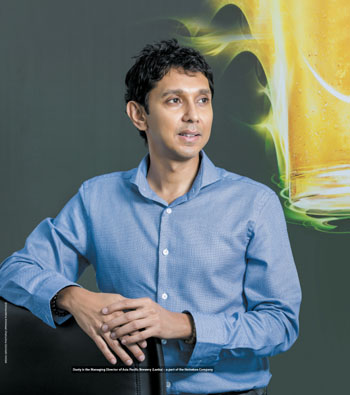BEVERAGE MARKET
 How do you view the current state of Sri Lanka’s beverage sector?
How do you view the current state of Sri Lanka’s beverage sector?
The local beverage sector is underdeveloped, in terms of choice, compared to international markets. People appear to prefer international brands, and there is a shift towards natural and healthy beverages. With economic growth, packaged beverages will continue to grow.
Dusty Alahakoon
WANTED THE PERFECT BREW
What challenges are unique to the alcoholic beverage sector?
The alcoholic beverage sector is impacted by several issues, including the prevalence of illicit alcohol and inequality in taxes.
For instance, mild beer (i.e. with less than 5% alcohol) is the most expensive alcohol in Sri Lanka, while spirits (ranging from 20-40% alcohol) are the cheapest – on a per millilitre basis. As for strong beer (8.8% alcohol), an excise duty of Rs. 315 a litre is levied; while for toddy (which has the same alcohol content), it is only 30 rupees a litre.
In November and December last year, the Government increased mild and strong beer taxes by 27 percent and 70 percent, respectively. But for spirits, the tax hike was only 25 percent. As a result, the beer market has fallen by 40 percent this year, compared to 2015, and consumers have shifted to spirits.
How do you view the Government’s policy on alcoholic beverages?
Governments around the world are focussing on reducing alcohol abuse-related harm, and maximising state revenues through taxes. However, we don’t see such a policy in Sri Lanka, as government agencies are sending mixed signals.
The current excise duty structure is inequitable, and promotes the consumption of beverages that are high in alcohol content. This could lead to alcohol abuse and serious social consequences. It also drives consumers towards illicit beverages, due to their affordability.
As a matter of priority, the Government should introduce an equitable tax structure that supports a coherent state policy.
Can the Government’s stance on alcoholic beverages be termed ‘fair’?
Globally, beer is considered less harmful than spirits. This is due to its low alcohol content and consumption, as beer is a carbonated beverage.
So incidents of abuse are fewer than with spirits, and beer products have a lower excise duty than spirits.
But in Sri Lanka, mild beer is the most expensive alcoholic beverage. In fact, the recent excise duty hikes on beer promotes the consumption of spirits.
According to the country profile in the Global Status Report on Alcohol and Health 2014 of the World Health Organization (WHO), Sri Lankans consume 85 percent of alcohol in spirits. Beer accounts for a mere 13 percent. Skewing of the consumption of spirits in this manner naturally leads to alcohol abuse.
Beer manufacturing is more capital intensive than spirits. With the 70 percent excise shock, the sector has plummeted by 40 percent. This seriously impacts investments in production facilities, and we are forced to restructure the supply chain, which has a direct impact on rural employment.
Is the hit taken by beer felt by the broader industry, as well?
I’m not sure, but it seems that the spirits sector has benefitted from increased consumption. Meanwhile, consumers have shifted to toddy and illicit alcohol, which will certainly impact government revenue.
The beer sector is closely associated with tourism. If, as a country, we aspire to attract four million tourists by 2020, mild beer should be more affordable and accessible to tourists. Currently, beer is sold at 2,800 outlets in Sri Lanka. This is another reason for illicit brewing, as there’s only one outlet every 22 square kilometres, on average.
So where do you see the sector 10 years from now?
We cannot consider a 10-year outlook, especially for the beer sector, given the current inconsistent policies. Global players require consistent policy frameworks, to commit to investments.
Globally, the consumption of mild beer, cider, and low and non-alcoholic beverages is growing, while spirits are declining. We hope that, with economic prosperity, similar trends will be seen in Sri Lanka.
The Government has the opportunity to provide an equitable tax structure, within a consistent alcohol policy that will promote foreign investment and tourism. The way forward is an equitable excise tax structure, based on the strength or content of alcohol – i.e. the higher the alcohol strength, the higher the taxes, which is the global norm. This will prevent the abuse of alcoholic beverages because of price, and lead to higher government revenues.
– Compiled by Hansani Bandara
Dusty is the Managing Director of Asia Pacific Brewery (Lanka) – a part of the Heineken Company





